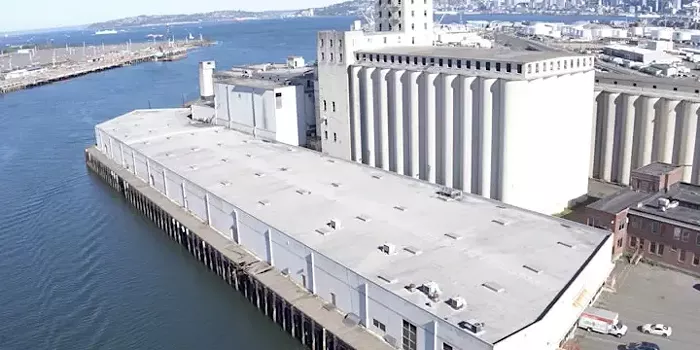On Monday, members of the Washington film community sent out an emergency call to action. King County was about to finalize the biennial budget, they said, and the County Council planned to withdraw funding from Harbor Island Studios, Washington’s only county-owned sound stage asset.
At the County Council meeting the next day, a staggering 67 out of the 92 in-person public commenters were there to talk about the importance of retaining funds for Harbor Island. The resounding takeaway was that Harbor Island Studios is a critical resource for the local film industry and that a loss of funds would be devastating, forcing many workers to move out of state to pursue their livelihood. Several speakers also pointed out that the film industry supports surrounding businesses and that its loss could have a profound ripple effect on the local economy.
Through a last minute amendment, the Council saved the film stage. But it’s only funded for the next six months. “We’re going to have to find a different funding source,” said County Councilmember Claudia Balducci. “But I want you all to know that your testimony has been very meaningful, and we’re going to work very hard this afternoon to try to find a way to buy that time so that we can then find a better funding source… If there’s any movement today, please know it is only because you showed up.”
Peter Cowell, an independent freelance filmmaker and sound mixer, told the council that he’d left the house for the first time since he and his wife welcomed their first newborn three days ago in order to make it, but that it was “worth it” to show up for an issue he felt so passionately about.
“My wife and I decided to stay here in Seattle, even though everyone told us we have to go to Los Angeles or New York or Vancouver to work in the film industry, because we had heard that there was a potential for it to become a new hub,” Cowell said. “Three weeks ago, I actually wrapped on a three-month network TV show that was shot at Harbor Island. And that show, I can certainly tell you, only came here because of Harbor Island. The studios are moving out of Los Angeles. They’re spreading all across the United States. It’s an incredibly unprecedented time, and this is the chance to secure Seattle as one of the next big hubs of production. On that production, we rented floors of hotels and got cars [and bought] hundreds of meals a day. It’s a great economic boon.”
King County Executive Dow Constantine introduced Harbor Island Studios in April 2021 in an effort to revitalize Washington’s once-thriving film industry and provide jobs in the creative economy as the state recovered from the financial crisis of the pandemic. “This is about making a smart public investment to help this creative industry grow and thrive here in King County,” Constantine said. “We don’t want Vancouver or Portland or Atlanta to keep serving as Seattle’s stand-in. We’re ready to spotlight the amazing talent of our region.” Since then, the studio has contributed 2,334 unique industry jobs and hosted 182 productions, including Adult Swim’s surreal comedy series Three Busy Debras and the Seattle season of the hit Netflix reality dating show Love Is Blind.
Councilmember Claudia Balducci tells The Stranger that around $200,000 was originally earmarked in the budget for maintenance and that the council planned to cut $30,000 from its funding. She explains that the funding conflict was over rent—Harbor Island Studios’ building is owned by King County Solid Waste Division, which purchased it in anticipation of the Cedar Hills landfill in East King County eventually filling up and closing. Once that happens, likely several years in the future, King County will need to ship its waste elsewhere and will use the Harbor Island property as a shipping terminal. In the meantime, the empty building has sat unused for over a decade, which led to the idea of offering it as a video production stage. If the property is used by another part of the County, they must pay rent to the Solid Waste Division.
“In the past, until this budget, that rent was essentially paid by in kind contributions,” Balducci says. “So the general fund, which is what pays for the studios, fixed the roof on this big building, so that money counted as the rent, but now all of those projects that were funded are all done. This year, they were faced with a $1.5 million [annual] rent bill that they had never had to pay before. The executive’s proposed budget allowed for that rent to be paid and balanced the budget. Nothing else got cut in order for that to happen.” But in the final version of the Council’s budget, they’d redirected the funds.
On Tuesday, Balducci sponsored an amendment to waive six months of rent for Harbor Island Studios and to reallocate $30,000 in funding for maintenance, which was approved by unanimous vote. She remarked that the council had been impacted by the sheer volume of public commenters in support of the organization. However, she cautioned that this was a stopgap measure that would only “buy time” for Harbor Island and that additional solutions will be needed to ensure the studio’s long-term future. The council has ordered a study to evaluate the economic value of the studio in addition to a rent assessment.
In a statement, King County Executive-elect Girmay Zahilay echoed Balducci’s sentiment: “Harbor Island Studios is an incredibly valuable asset for King County’s creative economy, and I want it to succeed for the long term. But the general fund is the wrong funding source because it’s volatile, very constrained, and it’s also what we rely on for food security, public health, public safety, and other basic safety-net services. For years, the council has asked the Executive for a sustainable plan for Harbor Island Studios, and we still don’t have one. My goal is to work with all parties to finally create a long-term solution that protects this important facility without putting additional strain on other essential services.”
While the studio has gained a temporary reprieve, its advocates will have its work cut out for them over the following six months to secure its future. “I think we need to get together with the folks who are the most engaged and see the value of being able to have this,” says Balducci, who calls herself a “convert” on the issue. “This is a very unique place. There’s no other affordable film studio capacity like it anywhere in the state, certainly not in King County. So if you want these smaller up-and-coming productions, or even some of the bigger ones, [to be] filmed in Seattle instead of Vancouver, then we need to figure out a way to pay whatever that rent is.”
Right now, they have a lot of ideas and no plan. “A number of ideas were thrown out on Tuesday—can we pass the hat and have a fundraiser? Have a nonprofit operate it and have them raise the money? Can we use some of the arts and culture-dedicated funding that exists to support this kind of effort?” Balducci says. “It would probably take a legal change to do that, because they largely are not eligible to use this money for profit, and films are for profit. So are there any economic development funds?…We’re going to have to really take a look at all the possibilities and see what works. And I suspect it’ll be a stack of a lot of little things that add up to a bigger thing.”
It’s not just the economic benefits that are at stake. Thomas Ackels, CEO of the video production company Offbeat Films, tells The Stranger that he views Harbor Island Studios as a “symbol of hope” for the film community and that it has significant value aside from its financial perks.
“I do think that there’s a lot of economic reasons why people support Harbor Island Studios,” he says. “But I also think there’s this indirect emotional connection, that maybe doesn’t bring in dollar bills in that way, but it supports people’s careers. It supports people’s dreams. It gives them a space to do this.”







